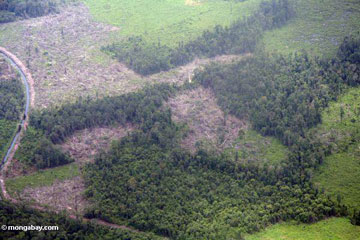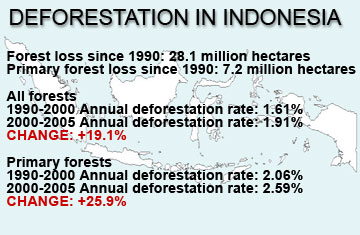Indonesia wants to be paid for slowing deforestation
Indonesia wants to be paid for slowing deforestation
Rhett A. Butler, mongabay.com
January 31, 2007
Indonesia voiced support for a proposal by a coalition of developing countries seeking compensation for forest conservation, according to a report from Reuters.
Rachmat Witoelar, Indonesia’s minister of the environment, told Reuters that poor countries should be paid for conserving forests and the services they provide the world.
“Preserving our forest means we can’t exploit it for our economic benefits. We can’t build roads or mines,” Witoelar is quoted by Reuters as saying. “But we make an important contribution to the world by providing oxygen. Therefore countries like Indonesia and Brazil should be compensated by developed countries for preserving their resources.”

Indonesia had the world’s world deforestation in 2006. |
The initiative, put forth more than a year ago by a coalition that now includes 15 developing countries, operates on the concept of “avoided deforestation” whereby developing countries are paid to prevent deforestation that would otherwise occur. The principal is based on the carbon storage capabilities of tropical forests: when trees are cut and burned, carbon is released into the atmosphere contributing to global warming. Indonesia is the world’s largest producer of greenhouse gases that result from forest clearing. Worldwide about 20 percent of greenhouse gas emissions are produced by deforestation. By preventing deforestation, developing countries can effectively cut emissions of heat-trapping gases. These “carbon credits” can be exchanged with industrialized countries for cash.
Such an initiative could be worth billions to Indonesia which had the world’s highest deforestation rate in 2006 when the country may have lost some 30,000 square kilometers of forest — one of the largest areas of forest loss on record. Forest clearing in Indonesia is fueled by logging and fires set by large-scale agricultural firms for the establishment of oil palm plantations.
Indonesia is now the world’s third largest producer of greenhouse gases due its emissions from land use change according to Wetlands International. About 10 percent of global carbon emissions — 2 billion metric tons of CO2 — are emitted by Indonesia each year.
Related
Forest fires result from government failure in Indonesia. Indonesia is burning again. Smoke from fires set for land-clearing in South Kalimantan (Borneo) and Sumatra are causing pollution levels to climb in Singapore, Kuala Lumpur, and Bangkok, resulting in mounting haze-related health problems, traffic accidents, and associated economic costs. The country’s neighbors are again clamoring for action but ultimately the fires will burn until they are extinguished by seasonal rains in coming months.
California adopts massive solar energy project. Indonesia could earn billions of dollars for reducing its deforestation rate through a carbon finance mechanism under consideration this week at U.N. climate negotiations in Nairobi, Kenya. The initiative, put forth a year ago by a coalition that now includes 15 developing countries, calls for compensation from industrialized nations in exchange for rainforest conservation. The plan relies on the concept of “avoided deforestation” whereby developing countries are paid to prevent deforestation that would otherwise occur. The principal is based on the carbon storage capabilities of tropical forests: when trees are cut and burned, carbon is released into the atmosphere contributing to global warming. Indonesia is the world’s largest producer of greenhouse gases that result from forest clearing. Worldwide about 20 percent of greenhouse gas emissions are produced by deforestation. By preventing deforestation, developing countries can effectively cut emissions of heat-trapping gases. These “carbon credits” can be exchanged with industrialized countries for cash.















